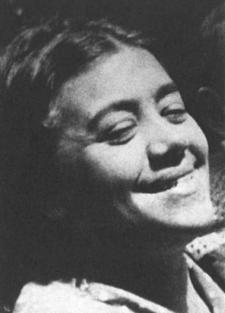
by Sheva Zucker
Candles of Song: Yiddish Poems about Mothers Celia Dropkin
Yiddish poems about mothers, in memory of my mother, Miriam Pearlman Zucker, 1914-2012.

Photo of Celia Dropkin
Celia Dropkin (1888-1956) was born Celia Levin in Bobruisk, White Russia. She lost her father at an early age and her mother never remarried. She had a high school education and began writing poetry in Russian while still a young woman and was greatly encouraged by the Hebrew writer U.N. Gnessin. When she was about 21 she married Shmaye Dropkin, an active socialist in the Bund party, and in 1912 she followed him to America where he had fled for political reasons.
Between 1910-1926 she bore six children, five of whom survived, and around 1918 she began writing poetry in Yiddish. She published in many of the Yiddish publications of the day, including Inzikh, Tog, and Tsukunft. Her books include In heysn vint – lider (In the hot wind – poems; 1935) and In heysn vint: Poems, Stories and Pictures published posthumously in New York by her children. Her poems are remarkable for their sensuality, bold eroticism, and inversion of the reader’s expectations of traditional women’s writing.
Here, Mayn Mame, by Celia Dropkin, read by Sheva Zucker:
My Mother
My mother,
Widowed at twenty-two
And left with two small children,
Chastely determined
Never to be anyone’s wife again.
Her days and years went by quietly
As if lit by a begrudging wax candle.
My mother was never anyone’s wife again,
But through many days, many years,
Many nights, the sighs
Of her young and loving being,
Of her yearning blood,
Entered my childish heart,
Deep within me I absorbed them all.
My mother’s hidden yearning
Poured into me freely
Like an underground stream.
And now my mother’s seething,
Holy,
Deeply hidden desire
Spurts openly from me.
First published in E. Korman, Yidishe dikhterins antologye (Anthology of Yiddish Women Poets), Chicago 1928;
In heysn vint (In the hot wind), New York, 1935; 1959.
Translated by Seymour Levitan
Mayn Mame
Mayn mame,
A tsvey un tsvantsik-yorike,
An almone mit tsvey kleyninke kinder geblibn,
Tsniesdik hot zi bashlosn
Tsu keynem a vayb mer nit vern.
Shtil hobn zikh ire teg un yorn getsoygn,
Vi fun a kargn vaksenem likht baloykhtn.
Mayn mame iz tsu keynem a vayb nit gevorn,
Nor ale filtegike,
Filyorike, filnakhtike ziftsn
Fun ir yungn un libendn vezn,
Fun ir bkendik blut,
Hob ikh mit mayn kindershn hartsn farnumen,
Tif in zikh ayngezapt.
Un mayn mames farborgene heyse benkshaft
Hot zikh, vi fun an untererdishn kval,
Fray in mir arayngegosn.
Itst shpritst fun mir ofn
Mayn mames heyser,
Heyliker,
Tif farbahaltener bager.
מײַן מאַמע
מײַן מאַמע, אַ צווײ און צװאַנציק־יאָריקע,
אַן אַלמנה מיט צװײ קלײנינקע קינדער געבליבן,
צניעותדיק האָט זי באַשלאָסן
צו קײנעם אַ װײַב מער ניט װערן.
שטיל האָבן זיך אירע טעג און יאָרן געצױגן,
װי פֿון אַ קאַרגן װאַקסענעם ליכט באַלױכטן.
מײַן מאַמע איז צו קײנעם אַ װײַב ניט געװאָרן,
נאָר אַלע פֿילטעגיקע, פֿיליאָריקע, פֿילנאַכטיקע זיפֿצן
פֿון איר יונגן און ליבענדן װעזן,
פֿון איר בענקענדיק בלוט,
האָב איך מיט מײַן קינדערשן האַרצן פֿאַרנומען,
טיף אין זיך אײַנגעזאַפּט.
און מײַן מאַמעס פֿאַרבאָרגענע הײסע בענקשאַפֿט
האָט זיך, װי פֿון אַן אונטערערדישן קװאַל,
פֿרײַ אין מיר אַרײַנגעגאָסן.
איצט שפּריצט פֿון מיר אָפֿן
מײַן מאַמעס הײסער,
הײליקער,
טיף פֿאַרבאַהאַלטענער באַגער.
צו ערשט געדרוקט אין ע. קאָרמאַן, ייִדישע דיכטערינס אַנטאָלאָגיע, שיקאַגע, 1928
דערנאָך אין אין הייסן ווינט, 1935, 1959
Poems cross-posted with ShevaZucker.com.
Dr. Sheva Zucker is currently the Executive Director of the League for Yiddish and the editor of its magazine Afn Shvel. She has taught and lectured on Yiddish language, literature and culture on five continents.